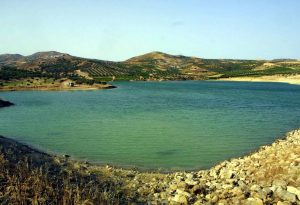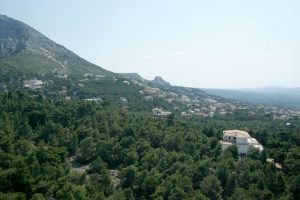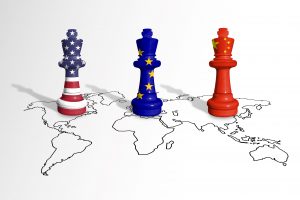The President of European Economic and Social Committee (EESC), Oliver Röpke, in an interview with To Vima‘s Brussels Correspondent Eirini Zarkadoula, underlined that “Ocean governance is not just a marine affair. The impact of humans on the oceans also comes from land-based activities, like waste, pesticides, plastics”. At the same he said that “the current EU policies do not sufficiently address water, which until now has been considered as an environmental issue that was part of the Green Deal”, while he stands in favour of “a European Commissioner for water or the inclusion of water in other important European policies and strategies, such as the Common Agricultural Policy, the EU Industrial Strategy and the Stability and Growth Pact”.
What is the EU Blue Deal and its targets?
In the past years, we have seen droughts, floods and devastating fires in Europe. These examples, which are a reality not only in Greece but across our continent, demonstrate the horrible effects of water scarcity. This is why we, at the EESC started to work on a strategy – the EU Blue Deal, to make water a political priority for the EU. The current EU policies do not sufficiently address water, which until now has been considered as an environmental issue that was part of the Green Deal. We want water to be a stand-alone and independent priority for the next European Commission.
We presented our call for the EU Blue Deal last October and I put forward a declaration with a list of 21 concrete actions to tackle water scarcity. Our position is rather open, as our aim was to provide the basis from which the European Commission, together with national governments and stakeholders, can develop a structured approach for water – a true EU Blue Deal. However, there are three pillars that I see as fundamental for a successful strategy: policy, funding and knowledge.
Firstly, we need coordinated policy efforts at European and national levels. This entails, for example, the appointment of a European Commissioner for water or the inclusion of water in other important European policies and strategies, such as the Common Agricultural Policy, the EU Industrial Strategy and the Stability and Growth Pact.
Then, we need funding – more flexible and accessible mechanisms for existing funds, and additional money. We need a true Blue Transition fund.
Lastly, we must take advantage of existing knowledge, and use the data available for the development of a Blue Deal, but also to give power to consumers to make water-smart choices. We propose setting up a proper European Water Centre and the creation of water consumption label among others.
We need knowledge to make good policy, and money to turn this policy into reality.
Do you think that it is possible to have a common EU policy regarding the water regarding your proposals and in which angle?
A common, coordinated and comprehensive EU policy is absolutely needed. If we join forces now and adopt water as an EU priority for the years to come, it is not too late to act. The cost of inaction is higher than the cost of acting now.
Given the vital nature of water and the magnitude of the challenges ahead, we believe that water cannot remain simply one of the topics inside the Green Deal. Although climate and water policies are interlinked, addressing water challenges requires actions beyond environmental considerations. For instance when it comes to providing access to safe water and sanitation or securing resilient water supply infrastructures.
Many Member States are waking up to the importance of addressing the water crisis. We have seen the ReWaterEU ideas put forward by Portugal, which are largely in line with many of our EU Blue Deal proposals. Many other Member States are working on national water strategies, which is an encouraging sign.
From our side, we will continue to work closely with the Member States, European Parliament, European Commission and the civil society to foster a coordinated approach at EU level. Because the fact is that no country can tackle these challenges alone.
What is water reuse and how it could contribute to the circular economy?
Water reuse is a very important element of the circular economy, and it can help address for instance water scarcity for everyone whether agriculture, industry or households.
Good practices on water reuse exist in Europe. We believe that policies and incentives should be put in place to support the development of technologies and innovations enabling water efficiency and reuse as well as the take-up of such technologies by all users, including industries, agriculture, the public sector and households.
For example, a paper mill can circulate the same water 13 times within its processes, thus reducing the need to use drinking water in the area, which suffers from water scarcity.
Waste water reuse also allows for the recovery of energy and valuable nutrients, which can be recycled back into the economy. This is something we are currently working on at the EESC and will adopt an opinion on in July.
How important is the role of maritime security on the course for a sustainable blue planet?
The Russian aggression against Ukraine was a stark reminder of why maritime security is so important. We see Europe’s maritime technologies sector as a cornerstone for the EU’s defence and coastal protection and surveillance, for the transport of goods, energy and passengers, and for achieving the EU’s political goals in terms of the European Green Deal and the blue economy. The EESC urges the EU institutions, Member States, social partners and other stakeholders to take policy actions as soon as possible to save and protect this strategic sector to ensure maritime autonomy, access to trade and global maritime leadership.
We have called for enhanced efforts at national, EU and international level to increase cybersecurity, since cyber risks will increase together with the technological evolution and the introduction of automated processes and vessels. It is important to ensure that workers have the necessary skills, including cybersecurity.
The marine environment is a complex system. This is why we have urged the EU to address a wider range of sectors involved in activities at sea that can put the environment and human health at risk, including tourism, ship demolition and construction, energy and aquaculture. Maritime transport for instance can have a huge environmental impact, especially when it comes to ship demolition, and we must be ready to address natural disasters – both issues are tackled in by the EESC opinion on setting the course for a sustainable blue planet.
The EU is committed to the UN Decade of Ocean Science for Sustainable Development 2021- 2030. Do you feel that there are still some gaps regarding the knowledge of the oceans in connection with blue economy?
The EESC believes that we should continue to develop international policies to promote efficient use of water in all sectors of the economy and society. One of the objectives of the EU Blue Deal is to upgrade the UN treaty framework on all water-related issues, and to swiftly implement international agreements, such as the UN High Seas Treaty.
The ocean is a complex and interconnected system, which needs knowledge-based policy. This is why the EESC has called for an involvement of different disciplines and expertise, like data, sciences, psychology, sociology, economy in the development of the policy. We also believe that new modes of governance, like self-organisation or decentralisation, should be looked at more closely and extended to all sectors of the blue economy.
Ocean governance is not just a marine affair. The impact of humans on the oceans also comes from land-based activities, like waste, pesticides, plastics. Therefore, ocean governance needs to take into account all SDGs, not just one that focuses on life below water. We need greater ocean literacy and social dimension to promote social dialogue, increase security, improve working conditions, create quality jobs and develop workers’ skills. And most crucially, civil society and local stakeholders should be involved at every stage of the policy making process, from consultation and co-design of plans to the implementation and final evaluation.




